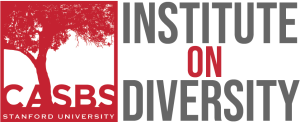
The Center for Advanced Study in the Behavioral Sciences (CASBS) at Stanford University announces the launch of a summer training Institute on Diversity to engage in field building around the social scientific investigation of why, how, and when difference makes a difference.
CASBS will host a two-week institute of individual cohorts during the summers of 2023, 2024, and 2025. The inaugural summer institute will take place from June 19-30, 2023. CASBS administered an open application process and selected the 2023 cohort.
The Institute on Diversity is directed by 2015-16 CASBS fellow Mary Murphy, the Class of 1948 Herman B Wells Endowed Professor and Professor of Psychological and Brain Sciences at Indiana University. The co-directors are 2021-22 CASBS fellow Jennifer Richeson, the Philip R. Allen Professor of Psychology at Yale University; and 2008-09 CASBS fellow Katherine Stovel, Professor and Chair of the Department of Sociology at the University of Washington.
“CASBS’s history of bringing together the brightest minds from across the social and behavioral sciences to study the most pressing issues of our time makes it the ideal setting for this training institute,” said Murphy. “We cannot wait to get started this summer.”
The initial institute will consist of up to 12 early-career scholars, the institute directors, and a rotating group of external faculty for intensive examination of questions as well as collaboration on core theoretical, methodological, and multi-disciplinary substantive issues of mutual interest relating to why and how diversity and difference matters.
CASBS will initiate community-building convocations beginning in the 2023-24 academic year. Over three years, the ongoing interactions will facilitate professional development and stimulate creation of a network of leading and rising scholars – many from backgrounds underrepresented in higher education – committed to advancing the social scientific study of diversity.
The CASBS Institute on Diversity is supported by the MacArthur Foundation, the Ford Foundation, and the Spencer Foundation.
The new summer Institute on Diversity also reinforces CASBS’s role as a hub where emerging networks convene and flourish. Over nearly seven decades, the Center has hosted numerous summer institutes in the forefront of field building and forging significant new lines of research and inquiry. The CASBS summer institute on Organizations and Their Effectiveness, launched in 2016 and still going strong, is the most recent example of a CASBS training institute that has effectively reinvigorated a multi-disciplinary field and pushed it to new frontiers.
More broadly, the new institute initiative reflects the deep embedding of multi-year projects, programs, institutes, and networks within the CASBS landscape that are a hallmark under Margaret Levi, the Center’s director since 2014. Such collaborative research endeavors are primary drivers situating the Center as a social science ideas accelerator of sorts. They enhance prospects for breakthroughs and the production of collective knowledge that no one scholar could produce independently.
“Increasingly, it’s through bringing together dynamic teams and cohorts that we’ll truly break down disciplinary barriers, develop innovative new frameworks of understanding, and gain traction on thorny problems and issues of contemporary societal importance,” said Levi. “It’s a generative model that has provided proof of concept at the Center in recent years. So I’m just ecstatic that we will apply our approach to the scientific study of diversity with this training institute.”
The CASBS summer training Institute on Diversity emerges in an environment of both opportunity and challenge.
It builds on the strength in recent years of first-rate scholarship on race, ethnicity, and their intersections with other social categories, processes, and institutions. Though much of this work does investigate how, why, and under what conditions difference makes a difference in people’s lives, it has been impeded by disciplinary boundaries and traditional evaluation criteria that often is siloed. Those siloes make cross-disciplinary progress difficult to achieve.
In addition, universities around the country are responding to the imperative of diversifying their faculty, with many offering promising emerging scholars from underrepresented backgrounds postdoctoral positions and fellowships intended to be on-ramps to research faculty positions. However, many of these programs have emerged in piecemeal fashion, and the training, career mentoring, and intellectual community provided to these scholars – which research shows to be predictive of early-stage faculty success – vary widely. The concern is that many promising young scholars who study diversity are receiving few cross-disciplinary opportunities for intellectual and professional network development beyond their graduate programs.
CASBS and its new institute are uniquely positioned precisely to address both circumstances, according to Murphy.
“When convened here at CASBS, the training institute will foster rigorous cross-disciplinary interaction, bringing together early career scholars across the social and behavioral sciences who study diversity to learn about a variety of disciplinary approaches, theories, methods, and ideas to enhance their scholarship,” said Murphy. “They will interact with each other, with us, and with visiting senior scholars of diversity across fields.”
“More importantly, with convocations among the three summer cohorts at CASBS and anticipated interactions beyond CASBS’s hilltop campus, the institute will help advance professional development and promote the creation of an enduring and expanding network of scholars who will form connections and supports for each other as they traverse the tenure track.”
The portal for applying for the 2023 cohort closed on January 7, 2022. For information on eligibility, fellowship support, application requirements, visit https://casbs.stanford.edu/diversity-institute.
# # #
Written by Mike Gaetani
